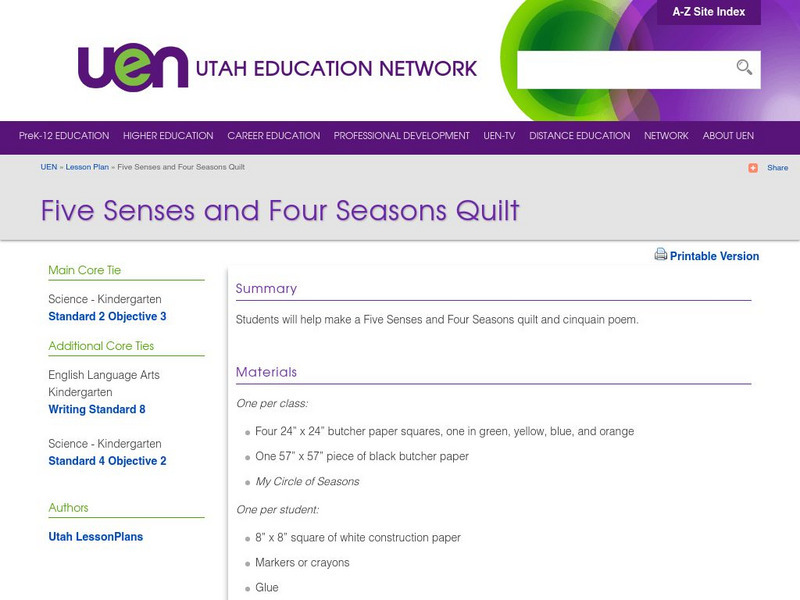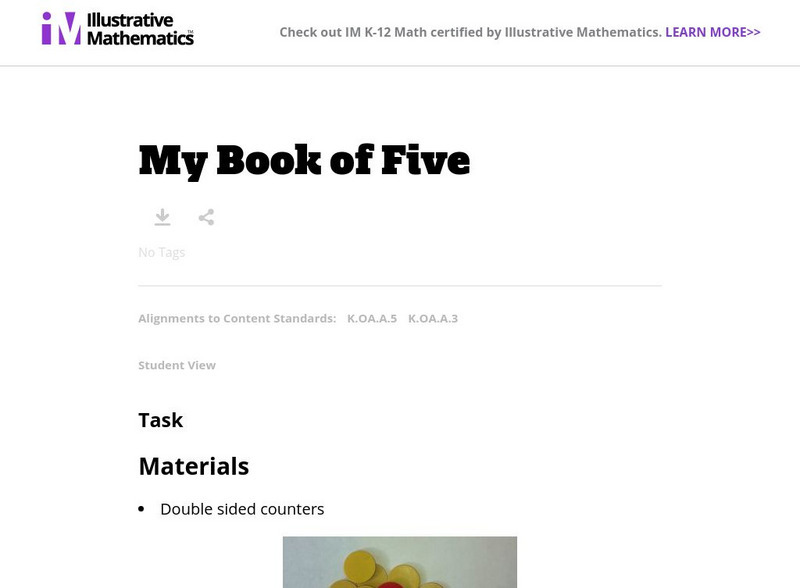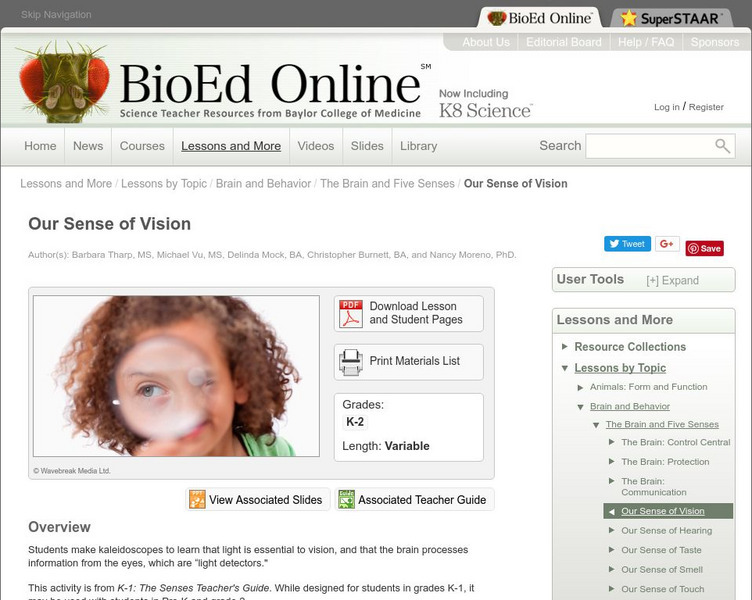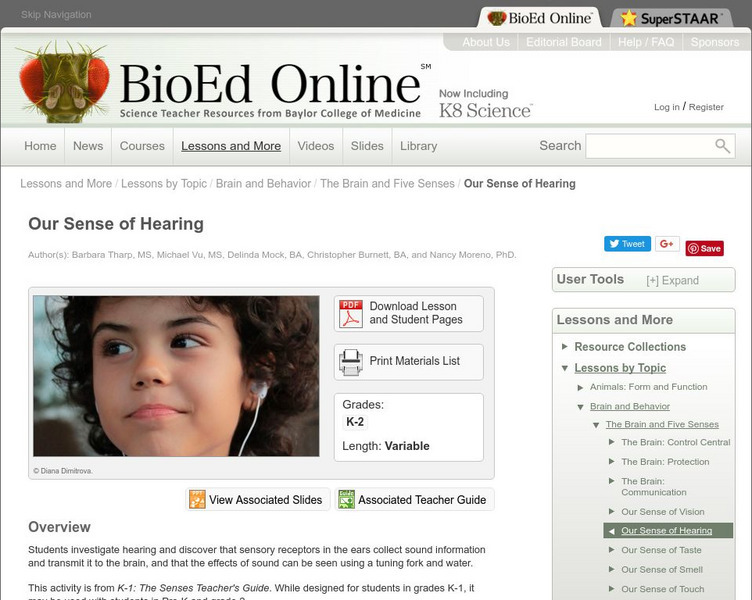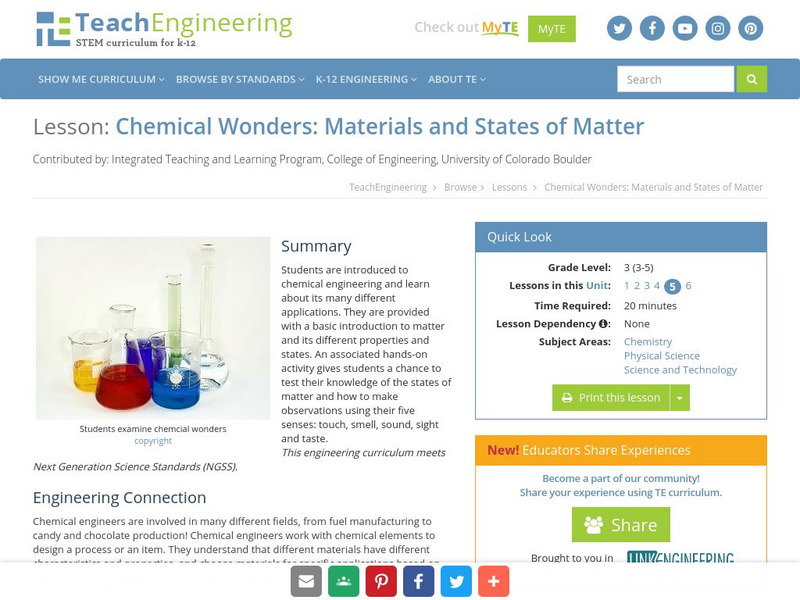eSchool Today
E School Today: Your Revision Notes on the Five Senses
Learn how the sense organs are structured and how they function to provide you with five senses.
Utah Education Network
Uen: Five Senses and Four Seasons Quilt
This lesson plan engages students in liistening to Gerda Muller's book, My Circle of Seasons. Students will investigate how the five seasons will help them learn aobut the five seasons. Students will write individual cinquain poems and...
Alabama Learning Exchange
Alex: The Five Senses
In this lesson, students discover the five senses through literature and the Internet. Students create a presentation to demonstrate the five senses. Students also become aware that not everyone has all five senses.
Illustrative Mathematics
Illustrative Mathematics: My Book of Five
Students will be given double-sided counters/dots to complete this activity. They will take five counters in their cupped hands (or a cup), shake them around, pour them onto the desk. Next, they count how many counters are yellow and how...
Alabama Learning Exchange
Alex: Sense Suspense
In this language development lesson, Kindergarten ELLs learn the five senses, classify objects using the five senses, and create an ABC book modeled after Bruce McMillan's Sense Suspense in which they demonstrate their learning.
Science and Mathematics Initiative for Learning Enhancement (SMILE)
Smile: Introduction to the Senses
This lesson plan allows students to investigate body parts associated with each of the five senses.
BioEd Online
Bio Ed Online: Our Sense of Smell
How does our sense of smell work? In this lesson learners use four different flavors of dry soft drink mix to investigate the sense of smell, and learn that the nose can detect very small particles in air, and transmit the information to...
CPALMS
Cpalms: Reading With Our Eyes, Fingers, Toes, Ears and Nose
[Free Registration/Login Required] In this lesson, students are learning to identify sensory words in their reading, specifically in poetry. Students will gain a perspective on how authors use sensory words to portray their ideas. They...
Alabama Learning Exchange
Alex: It's Great to Be Me!
This lesson addresses the similarities and differences among people. Incorporating the literature of Eric Carle and a virtual field trip focusing on healthy habits and the five senses, students will have a greater sense of their...
Better Lesson
Better Lesson: Where Does That Fall on the Number Line?
Where does five-thirds belong on a number line? What about 1.61? Students apply their knowledge of fractions and decimals in order to compare and order fractions and decimals.
Common Sense Media
Common Sense Media: Education: Advertising Detectives
Learners learn to recognize five different kinds of online ads prevalent on children's sites. They learn how to distinguish advertising content from other content on a website. Free membership required.
Better Lesson
Better Lesson: Missing Number Equations
Second graders will become more comfortable making sense of equations presented in missing answer (traditional) and missing number ( nontraditional) formats.
TeachEngineering
Teach Engineering: Solid, Liquid or Gas?
Students are given a variety of materials and asked to identify if each material as a solid, liquid or gas. They use their five senses - sight, sound, smell, texture and taste - to identify the other characteristics of each item.
BioEd Online
Bio Ed Online: Our Sense of Vision
Which parts of the body are involved in vision (seeing)? Is light important for vision? In this lesson plan students make kaleidoscopes to learn that light is essential to vision, and that the brain processes information from the eyes,...
BioEd Online
Bio Ed Online: Our Sense of Hearing
What causes sound? How do our ears detect sound? How do our brains recognize sound? In this lesson students investigate hearing and discover that sensory receptors in the ears collect sound information and transmit it to the brain, and...
Common Sense Media
Common Sense Media: Education: Strong Passwords (3 5)
Students learn how to create secure passwords in order to protect their private information and accounts online. They learn tips for creating safe passwords. They explore scenarios in which two characters choose passwords, and they use...
Utah Education Network
Uen: Time Capsule
First graders will learn to compare and contrast changes over time.
TeachEngineering
Teach Engineering: Chemical Wonders
Students are introduced to chemical engineering and learn about its many different applications. They are provided with a basic introduction to matter and its different properties and states. An associated hands-on activity gives...
Alabama Learning Exchange
Alex: 'Nuts' About Peanuts!! (Writing)
This lesson will be implemented as part of a unit about plants. The young scholars will describe the characteristics of a peanut and peanut butter (using their five senses) and record their observations/descriptions on a graphic...
Alabama Learning Exchange
Alex: Peanut/peanut Butter
During this lesson students navigate the Internet to learn about the accomplishments of George Washington Carver. Students explore the history of peanuts and sample different types of peanuts. They use their five senses to write a...
Common Sense Media
Common Sense Media: Education: Selling Stereotypes Grades 3 5
Students are introduced to the concept of a stereotype, and they explore the messages they receive regarding differences between boys and girls. They watch and discuss a video of a little girl questioning why companies market boys' and...
Better Lesson
Better Lesson: Towers, Towers, Towers 6 10
This lesson is the sequel to Towers! Towers! Towers! 1-5. Students continue to develop their sense of quantity as they build successive taller towers.
Better Lesson
Better Lesson: Mentally Speaking!
Using base ten blocks and place value, 2nd graders explore how to become more fluent in adding and subtracting two-digit numbers without regrouping.
Better Lesson
Better Lesson: How Are They Different?
SWBAT order a set of numbers and quantities up to 12 and compare two quantities up to 10 to see which one is greater. The students will also demonstrate their knowledge of how the numbers in the counting sequence are related (that each...

